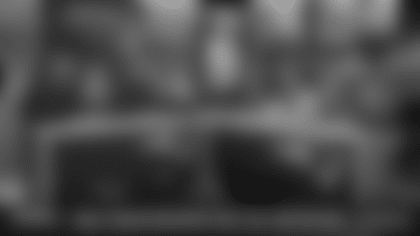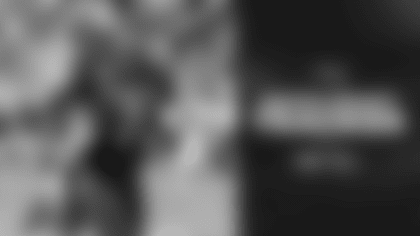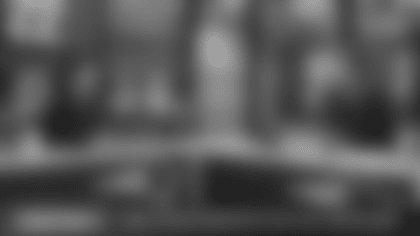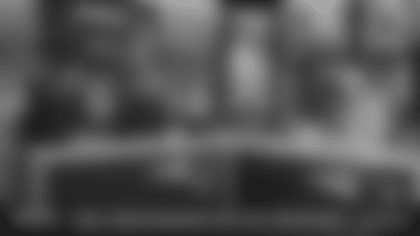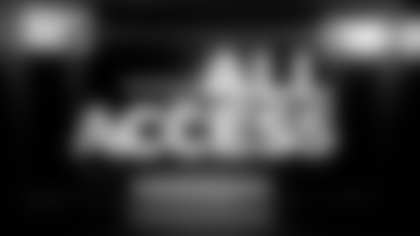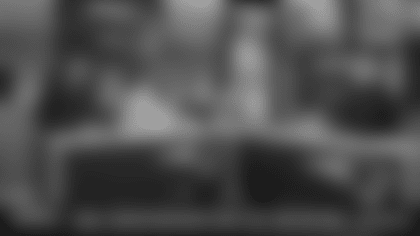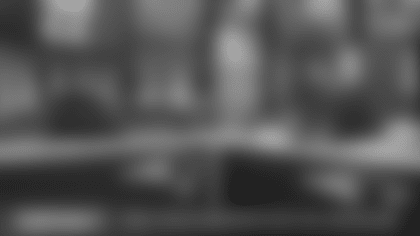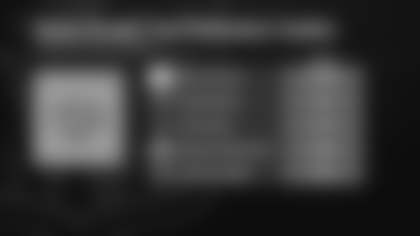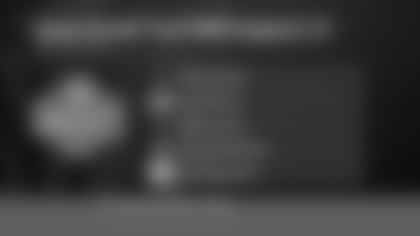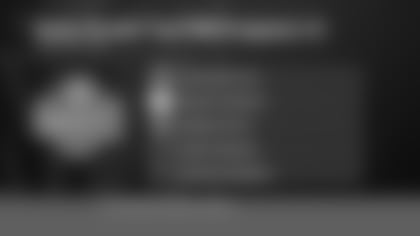**
BB:** First of all, before we get started on Arizona, just on behalf of the team and personally, congratulations [to] Troy [Brown] on his selection into the Patriots Hall of Fame. It's certainly a great tribute to a player that really deserves the recognition. I had the great pleasure and honor, really, of coaching him when he was here in '96, my first year here when I was coaching the defensive backs, working against him in practice every day as a secondary coach. Then as a head coach, just having him on the team and the important role that he had both as a player, captain, veteran player and ultimately a player that played in all three phases of the game – offense, defense and special teams – very well and in some very big games. He meant a lot to me and meant a lot to this football team and the organization. Congratulations to Troy and his family; great weekend and well deserved. Also in the past Patriots category, on behalf of the team, players, myself, we want to pass along our best wishes to Chuck Fairbanks. Chuck is headed into some surgery today. I just want to pass along our best wishes to Chuck and his family. Chuck has been a good friend for a long time and he's meant a lot to this organization. Really, at the time he came here, he did a great job in turning the Patriots around, making them into one of the top teams in the AFC. Also, some of the things he brought to the Patriots and the league in the '70s were things that stood the test of time and have been a big principle of this league for many, many years and the disciples and the people that were with him, such as the 3-4 defense, the way he organized the draft, personnel meetings, things like that and some of the great coaches that were here under Chuck. With that, moving on to Arizona. Compared to last week, it seems like a short week for us. I know it's not a short week, but it kind of seems that way [because] we had so much time to get ready for Tennessee. Now we're on a regular schedule and it seems like things are compressed a little bit, so part of our preparation is getting used to the shorter period; acclimating ourselves to a normal regular season week, which this is our first one. I think the players are trying to work hard to prepare for a team that's obviously very good; they're good in all three phases of the game. But it's also a team that we don't know very well that we haven't played recently, have a lot of new faces since we played them last time, so our preparation has really been challenged this week by the newness, the players, the scheme, how good they are and how good of a job they do in all three phases of the game, how much we have to get ready for. We'll wind it up today on the field and tie up some things tomorrow. It's been a good week, but it's a tough week because they're a tough team and they're tough to prepare for. Sorry to go so long there.
Q: Where did the friendship with Chuck Fairbanks begin?
BB: Through my relationship with Ernie [Adams]. Ernie started working for him in '75, the year I went to the Colts and kind of met Chuck through Ernie. Of course, people like [Defensive Line Coach] Hank Bullough, [Defensive Line Coach] Fritz Shurmur, all the coaches that were here, [Defensive Backfield Coach] Larry Weaver, [Quarterbacks/Special Assistant to the Coach John] Polonchek, all those guys who eventually either I knew or got to know through some type of connection, family or otherwise. Then when Chuck went to Colorado, that was the year I was in Denver.
Q: What do you remember from those Patriots teams, if anything?
BB: When I was with the Colts, they were in our division. We played them twice. He brought a good combination of some college principles like the 3-4 defense, a little bit of option, things like that to a pro-style game. But the work that he did in personnel and the drafts that he had here and players he drafted in the first round, first couple rounds during his time were…he brought in a team that was very, I would say, well-stocked personnel-wise. They were amongst the most talented teams in the league during that period of time through his drafting and personnel acquisitions and so forth. I watched what he did carefully and how he built a team from afar, but tried to take notice of it and maybe got a little closer inside look of it from talking to Ernie [Adams] and some of things that he told me about the way that they did things and so forth. It was very enlightening; definitely had an impact on my career early in terms of learning, watching Chuck install a 3-4 defense. He did a lot.
Q: Brandon Spikes missed a big chunk of the regular season last season but had a lot of tackles in the postseason. What can a healthy Brandon Spikes bring to the team this year?
BB: Brandon is a good player and he's played productively for us, just some of the things you mentioned. It's good to have him out there. He missed a little bit of time early at the beginning of training camp, but he came back and had a good preseason; finished up with a good camp. It seems like he's getting off to a good start here in the regular season. It's great to have him.
Q: Have you seen him take a big step now that he's in his third year and has a true offseason under his belt?
BB: Well sure, I think training camp helps all players. It helps them learn their fundamentals. It helps them learn their – not necessarily learn, but re-learn or re-apply – their fundamentals, their reads, their reactions and their individual techniques, whether it's man coverage taking on blockers, tackling, all those kind of things. Certainly playing all the plays that good defenders need to see: screen passes, draws, reverses, counter plays, bootlegs, misdirection, plays like that. Getting those reps on them in training camp and preseason games is important, as well as in the spring; just getting a good background on that stuff, seeing it, recognizing it where you don't get fooled by it. That's all part of practice and preseason and offseason training. It's important for the defensive players.
Q: How is Dan Connolly coming along?
BB: He's day-to-day. Whatever his status is, we'll list it on the injury report after practice today. It seems like he's getting better.
Q: We've seen a pretty versatile offensive line already with guys in and out. Do you think we'll see more of that this week?
BB: I don't know. We'll do whatever we feel like is best of our team to try to beat Arizona. I can promise you that, whatever that is.
Q: What do you see from Anthony Sherman, a local kid who went to school at UConn?
BB: Does a solid job for them; has a good role in the kicking game and a good role offensively. [He's] more of a blocker than a ball carrier. He's also involved in some of the third down offense in pass protection and as a receiver, catches the ball well. Tough kid. He's been productive for them in the kicking game.
Q: Daryl Washington is a guy that shows up in a lot of different ways. He's not really a common name around the NFL. Have you seen him show up in a lot of different ways?
BB: Yeah, absolutely. He's fast, he covers a lot of ground, makes plays sideline-to-sideline. Big guy, athletic guy. Of course they blitz him a lot. They blitz all their linebackers, but you have to deal with him in a lot of different ways. The front that he plays behind is very good, which is a problem. Dan Williams is a problem on the nose and of course [Darnell] Dockett and [Calais] Campbell are big problems at end or tackle if they play nickel or whatever front they happen to be in. I think the combination of all those players, they complement each other so if you're really worried about Dockett and Williams and Campbell, that frees a lot of things up for [Paris] Lenon and Washington to run and make plays. If you're too anxious to get up and block them and you go a little light on the down guys, Dockett and Williams, and you single them up ,then that's a problem. They have a very good group and they're all productive. Washington is fast, he covers a lot of ground. They count on that because they rush their outside linebackers a lot – whether they call them defensive ends or outside linebackers depending on what front they're in, but they're rushing a lot of the time. That means the inside guys have to be able to run and cover ground and make up some of that space out there. Both Lenon and Washington and Stewart Bradley for that matter, all do a good job of.
Q: How has Nate Ebner handled the mental aspect of making the jump of college to the NFL in terms of the special teams aspect of things?
BB: I think the special teams part of that has been pretty good. That's what he did; that was his experience. I think that's really where he had the most experience. He had a lot of plays, was good in college and he's done a good job for us there. Defensively, that's a bit of a different story: a bigger jump, more of a learning curve, less experience. He's handled that well, too, but I'd say special teams is more carryover from what he did in college to what we're asking him to do. Not that he doesn't have a lot to learn – every rookie does – but I'd say there's more carryover there.
Q: What does he have going for him? It looks like he has good size and runs well.
BB: That's a good place to start. I would say that: he has good size, he runs well, he has good quickness, he can tackle, he's a tough kid. Instinctively, he kind of has a nose for the ball, leverage and how to play off blockers and read the quarterback. It's not perfect, but he's got a little bit of a knack for that. He sees more than just the one guy he's looking at; he sees other things around him and has a way of putting it together.
Q: Is that something you can see even though he didn't play defense?
BB: No, because he didn't play defense, you couldn't see it, just like you couldn't see it with Steve Neal. It's hard to see instincts on a wrestling mat. No, you don't know how those things are going to turn out, but I would say Nate has better than average overall instinctiveness and a feel for the game that I don't want to say you can't coach, but some guys have more than others and I would say at this point early in the running, it seems like he has a pretty decent instinctive nature for the game.
Q: It's looking like Kevin Kolb is going to the start. Does that make planning easier now that you only have one quarterback to worry about?
BB: Well, we always have to be prepared for any player that's active on the roster to change in a play, just like it did last week; it changed in one play from one guy to another. We have to get ready for everybody. But Kolb is a good quarterback. He's active, he's had some good production in the league. You saw what happened last week when he went in and took Arizona on the game-winning drive after he hadn't played the whole game. We have a lot of respect for him and all their other players.
Q: Do you see any similarity between Nate Ebner and Matthew Slater? Slater played a little bit more offensively at UCLA.
BB: He also played a little bit of safety, I think his sophomore year or something like that. Similar, but different. Special teams first to offense or defense maybe second. Not knowing exactly how that's going to turn out, whereas other players you see offense or defense first, but to special teams with less experience because in college they were not used in that role, but that now becomes a primary role for them or a big role for them at this level. It's the same kind of projection but in reverse. There's usually more of the other ones. You see them on defense, you don't see them a lot in the kicking game as opposed to you see them a lot in the kicking game, but where do they project on offense or defense?
Q: Is that rewarding for you and the staff for going through the process and seeing some positive results from that?
BB: Yeah, sure but I'd say that's part of the process. It's similar but different to [Julian] Edelman, [who] never played receiver, never returned punts. [Matt] Cassel threw 30 [33] passes or whatever it was in his career. You could look at him, watch him work out as a quarterback, just like you could watch Steve Neal work out as a lineman, but there's no film of it. You can't ever watch him really play. There are some unknowns when you do that – take a player and project him to a position that he hasn't played. You have a reason for doing it. Sometimes you're right, sometimes you're wrong, or sometimes for whatever reason it just doesn't work out; you just can't make the transition sometimes. Sometimes you just can't give him an opportunity to do it for whatever reason. Sometimes the player's just not able to do that and sometimes they are. That's pretty unscientific. You take the information you have, do the best you can to analyze it and look at it but it's far from a sure thing. That's probably why a lot of times those guys drop in the draft or free agency or whatever – there's less certainty. Just remember there's a lot more Hall of Famers from the first round than any other round; there's a reason why they draft them there.


